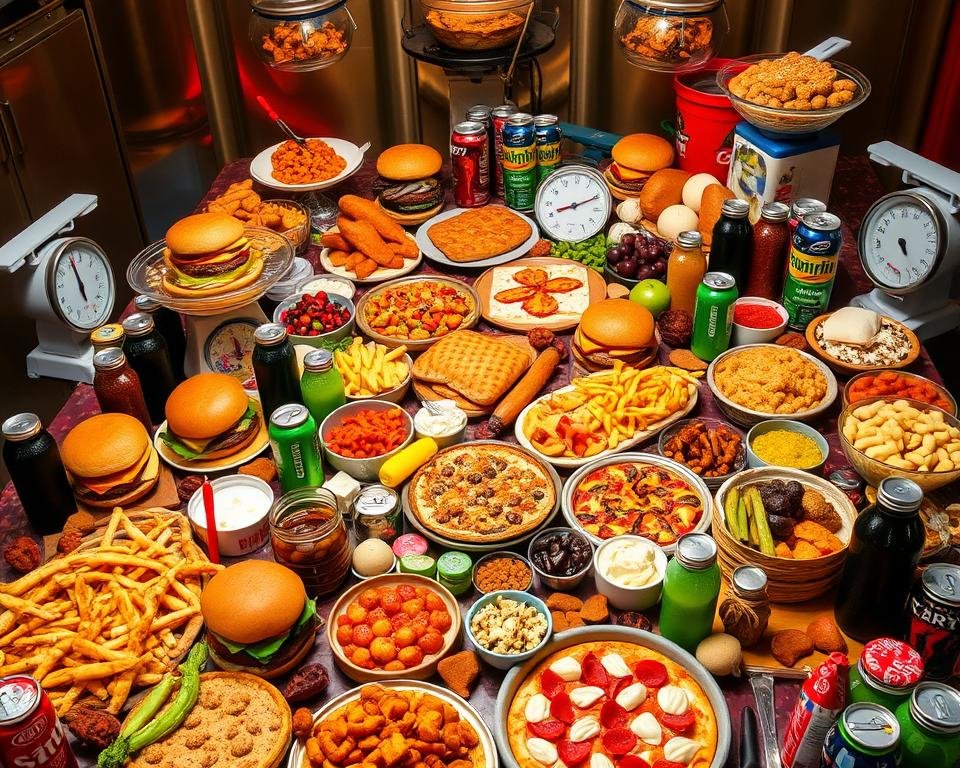Eating 6,000 calories a day is more than double the usual 2,500 calories. Studies show that eating this much for a week can lead to a weight gain of 8 pounds. This calorie surplus can cause quick changes in the body, like insulin resistance in just two days. It also increases oxidative stress as cells try to process the extra fuel.
While occasional overeating might be okay, eating 10% more calories than needed can lead to weight gain and health risks.
More than a third of American adults are obese, which is around 80 million people. A study with six healthy middle-aged men showed the effects of a 6,000 calorie diet for a week. Their diet was 50% carbs, 35% fats, and 15% protein.
Each of the six men gained an average of 8 pounds during the study.
Understanding Caloric Surplus and Weight Gain
To gain weight, you need to eat more calories than you burn each day. This extra energy helps your body build muscle and gain fat. Knowing about calorie surpluses is key for those trying to bulk up or gain weight.
What Defines a Caloric Surplus?
Eating more calories than you burn is a caloric surplus. Aim to eat 250-500 calories more than you need each day. This helps grow muscle without too much fat. Keep track of your calorie intake to ensure safe and effective muscle gain.
Normal Daily Calorie Requirements
Everyone’s daily calorie needs are different. They depend on age, gender, how active you are, and your metabolism. On average, men need about 2,500 calories a day. The Harris-Benedict equation helps figure out your basal metabolic rate and daily calorie needs.
Role of Macro nutrients in Weight Gain
Macro nutrients are important for weight gain. Protein helps build muscle, carbs give energy that can be stored, and fats are high in calories. Research indicates that protein overfeeding might not lead to much fat gain compared to carbs or fats. But, how your body responds to extra food can vary, influenced by genetics and where fat is stored.
“Focusing on nutrient-dense foods like lean proteins, complex carbohydrates, and healthy fats is key when bulking.”
Understanding calorie surpluses, daily calorie needs, and macro nutrients helps you plan a meal plan for weight gain. Tailor it to your goals and body type for the best results.
6000 Calories a Day: Immediate Body Changes
Eating 6000 calories a day can quickly change your body. You might see a weight increase in just 24 hours. This is because of more sodium and carbs. Your body also holds water with carbs, adding to the weight.
Undigested food and bowel movements can also make you weigh more. A small study with 15 healthy young men showed a 1.87-pound weight gain from 6000 calories in one day. This weight gain includes water and undigested food.
This quick weight gain isn’t healthy for the long term. Using mass gainer shakes or calorie-dense meals for weight gain needs careful planning. Always get advice from a healthcare professional.
“Binge eating, defined as consuming 1,500 to 3,000 extra calories in one sitting, can lead to rapid weight gain if it becomes a recurrent behavior.”
The effects of a 6000-calorie day might seem shocking at first. But, it’s important to think about the long-term health risks. A balanced diet is key for healthy and lasting weight gain.

Short-term Health Consequences
Eating 6000 calories a day can harm your health right away. One big worry is how it affects your blood sugar levels. Studies say insulin resistance can start in just two to three days of eating too much.
This means your body can’t control blood sugar well. This risk of metabolic disorders is real.
Effects on Insulin Sensitivity
The high-calorie intake hurts your insulin sensitivity too. Your cells have a hard time dealing with all the bodybuilding nutrition and high-calorie foods. This makes your body’s insulin response worse.
This oxidative stress response can damage proteins that help take up glucose. This makes things even worse.
These quick effects show how fast the body reacts to too many calories. Even a short time of overeating can lead to metabolic changes. These changes raise the risk of long-term health issues.
It’s key to eat a balanced diet and stay active. This helps avoid these risks and keeps your body working right.
Long-term Effects on Body Composition
Eating a bulking diet of 6000 calories a day can change your body a lot over time. Studies show that eating too much can make you gain weight, mostly fat. But, how much fat and muscle you gain depends on protein intake and exercise.
Research says eating a lot of protein and doing resistance training can help. Genetics also affect how fat is distributed when you eat more calories. People on a weight gain meal plan or bodybuilding nutrition should keep these in mind to get the best results.
While eating 6000 calories a day can quickly make you gain weight and change your metabolism, think about the long-term effects on your body. If you want to build muscle and get bigger, work with a healthcare professional. They can help you find the right balance of calories, nutrients, and exercise for your goals.



